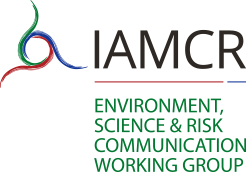Call for Candidates - S&WG Head elections 2021
Environment, Science and Risk Communication Working Group
The Environment, Science and Risk Communication Working Group (ESR) will be holding online elections for two co-Chair and two Vice-Chair positions, for the term 2021 - 2025.
The elections will be held online from 16 June until 14 September using the SurveyMonkey platform. Individual members and representatives of institutional members who are also registered as members of the ESR working group are eligible to stand for a position and to vote.
Interested candidates must send their name, institutional position, a statement of no more than 500 words and a photograph to elections [at] iamcr.org with a copy to the ESR working group’s current officers, Pieter Maeseele (pieter.maeseele [at] uantwerpen.be), Joana Diaz-Pont (Joana.Diaz [at] uab.cat), Kerrie Foxwell-Norton (k.foxwell [at] griffith.edu.au) and Maitreyee Mishra (maitreyee.mishra [at] gmail.com), no later than 16 May.
All candidates must be current members of IAMCR, and of the ESR working group. To verify if you are a member of the working group, log in to your IAMCR account and select “My Sections and Working Groups” from the menu.
You can find the election rules at: https://iamcr.org/governance/swg-rules
Read about the Environment, Science and Risk Communication Working Group
Candidates
For Co-Chair:
- Kerrie Foxwell-Norton (Griffith University, Australia)
- Maitreyee Mishra (Manipal Institute of Communication, MAHE, India & Universität Heidelberg, Germany)
For Vice-chair:
- Joana Díaz-Pont (Autonomous university of Barcelona, Political Science and Public Law, Spain)
- Pieter Maeseele (University of Antwerp, Belgium)
Statements
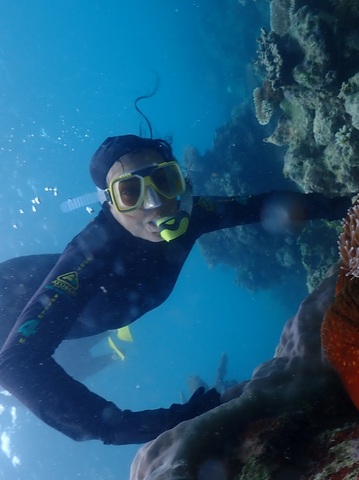 Kerrie Foxwell-Norton (Griffith University, Australia)
Kerrie Foxwell-Norton (Griffith University, Australia)
For the past four years, I have had the pleasure to work with Pieter Maeseele (University of Antwerp, Belgium), Kerrie Foxwell-Norton (Griffith University, Australia) and Maitreyee Mishra (Manipal Academy of Higher Education, India) as the ESR Working Group Committee.
We have worked together to ensure the ESR Working Group continues to strengthen and grow each year, working with IAMCR executive and staff to build the reputation and presence of our Working Group, within IAMCR and internationally. To that end, together we have have promoted a joint initiative with ECREA’s Science and Environment Communication Section, led an edited volume ‘The Local and the Digital in Environmental Communication’ published in the Palgrave/IAMCR book series Global Transformations in Media and Communication Research, alongside an associated webinar ‘When the Local meets the Digital: Implications and Consequences for Environmental Communication’ (taking place on 15 March 2018), sessions at three conferences (IAMCR 2017, ECREA 2018, IAMCR 2019); and worked with the Environmental Impact Committee (where I was also then Chair of that committee) to bring key scholars together to consider ‘Reimagining Environmental Sustainability for the Academic Conference’ at the 2018 Eugene Conference.
I would like to continue this tradition of activity and creating opportunities for our IAMCR ESR members. I hereby stand for election as Co-Chair of the ESR Working Group.
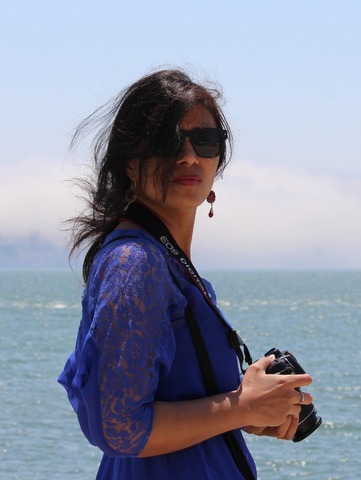 Maitreyee Mishra (Manipal Institute of Communication, MAHE, India & Universität Heidelberg, Germany)
Maitreyee Mishra (Manipal Institute of Communication, MAHE, India & Universität Heidelberg, Germany)
The IAMCR and its Environment, Science and Risk Communication (ESR) working group have been a great platform of international exchange and collaboration, and I have considered them my intellectual home since I first joined as a member in 2014. Since 2017, it has been a privilege to serve as vice chair of the ESR, alongside my wonderful colleagues, Pieter Maeseele (chair of the ESR), Joana Diaz-Pont and Kerrie Foxwell-Norton (my co vice chairs). During this period, we have worked on multiple interdisciplinary and international projects, including the book The Local and the Digital in Environmental Communication (Palgrave, 2020), which was the result of a collaboration with ECREA, and is a part of a Palgrave/IAMCR book series. Among other conference responsibilities, in 2018, we also organised a webinar titled ‘When the Local Meets the Digital in Environmental Communication’.
It has been a great honour to contribute to the ESR and I wish to continue to serve the working group as co-chair (with Kerrie Foxwell-Norton). Having lived in 7 countries in 4 continents, my personal philosophy draws heavily from internationalism, which stresses interconnectedness and a respect for diversity in all forms. When it comes to environmental issues, this becomes even more relevant. As an environmental communication researcher and (climate) anthropologist, my work is strongly interdisciplinary, and has focused heavily on the global South, particularly India. As Assistant Professor at the Manipal Institute of Communication, India I have taught environmental communication and film studies, since 2010. Over the years, I have published work on Indigenous peoples’ movements, environmental communication, film and gender studies. My most recent publications include the aforementioned book with my IAMCR colleagues, as well as a chapter on Environmental Journalism in India in David Sachsman and JoAnn Myer Valenti’s book The Routledge Handbook of Environmental Journalism (Routledge, 2020). I bring my varied experiences and observations of environmental challenges in the developing world to the WG and look forward to bringing more representation of the Global South. In this part of the world, the Covid-19 crisis has meant revisiting the importance of communicating science, and the climate crisis remains the greatest concern of our time- these are issues that are at the heart of the ESR WG. Looking at these issues and beyond, I seek an opportunity to further expand the WG alongside Pieter, Joana and Kerrie and hope to bring in more voices from the Global South.
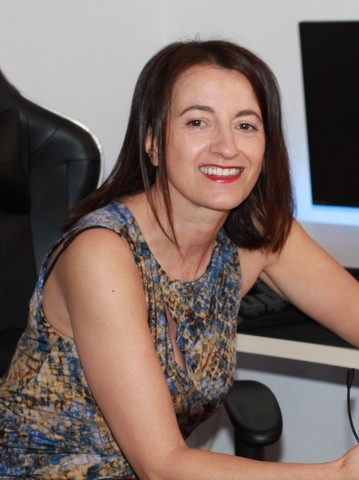 Joana Díaz-Pont (Autonomous university of Barcelona, Political Science and Public Law, Spain)
Joana Díaz-Pont (Autonomous university of Barcelona, Political Science and Public Law, Spain)
IAMCR has provided me with the privilege to work during the last three years with Pieter Maeselle (University of Antwerp, Belgium) , Kerrie Foxwell-Norton (Griffith University, Australia) and Maitreyee Mishra (Manipal Academy of Higher Education, India). We have promoted a joint initiative with ECREA’s Science and Environment Communication Section, the edited volume ‘The Local and the Digital in Environmental Communication’ published in the Palgrave/IAMCR book series Global Transformations in Media and Communication Research, the webinar ‘When the Local meets the Digital: Implications and Consequences for Environmental Communication’ (taking place on 15 March 2018), and sessions at three conferences (IAMCR 2017, ECREA 2018, IAMCR 2019). I hereby stand for re-election as Vice-Chair.
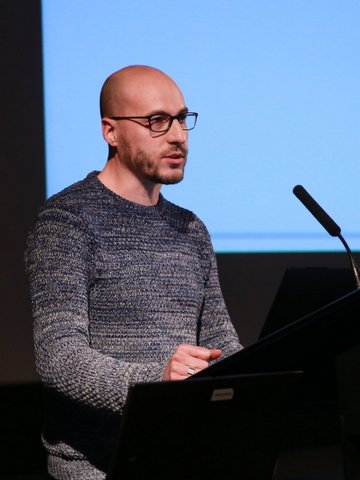 Pieter Maeseele (University of Antwerp, Belgium)
Pieter Maeseele (University of Antwerp, Belgium)
IAMCR is the key international academic association that promotes both global inclusiveness and critical media and communication scholarship. It has been a privilege to contribute to IAMCR though my involvement in the Environment, Science & Risk Communication Working Group, first as a member, later as part of the section head. In 2013, I was honored to succeed Anders Hansen, its founder, as Chair. In 2017, at the Cartagena conference, a new section leadership was elected. My wonderful colleagues Joana Diaz-Pont (Universitat Autònoma de Barcelona, Spain), Kerrie Foxwell-Norton (Griffith University, Australia) and Maitreyee Mishra (Manipal Academy of Higher Education, India) joined the section head. These last few years have been fascinating in many respects. I have been the program coordinator for 9 IAMCR conferences, bringing me into contact with so many of you in diverse roles as authors, reviewers, chairs and discussants. I am reminded of the 2018 Oregon conference in particular, with two important milestones: we celebrated the WGs 30th anniversary by organizing the roundtable ‘The Past & Future of Environment, Science & Risk Communication research’, with distinguished panelists such as Alison Anderson, Anabela Carvalho, Robert Cox, Libby Lester, and Susanna Priest. And we organized a Special Session with the title ‘Reimagining Environmental Sustainability for the Academic Conference’ about how to improve the environmental sustainability of academic conferences.
I am also particularly proud of the joint initiatives with ECREA’s Science and Environment Communication Section, being the edited volume ‘The Local and the Digital in Environmental Communication’ published in the Palgrave/IAMCR book series Global Transformations in Media and Communication Research, the webinar ‘When the Local meets the Digital: Implications and Consequences for Environmental Communication’ (taking place on 15 March 2018), and sessions at three conferences (IAMCR 2017, ECREA 2018, IAMCR 2019). After two terms as Chair, it is time to pass the torch. I do stand for re-election as the WG’s Vice-Chair to take on a supporting role for Joana, Kerrie and Maitreyee. Together we want to take the WG into a post-Covid future where tackling the climate emergency will be the number one priority.
